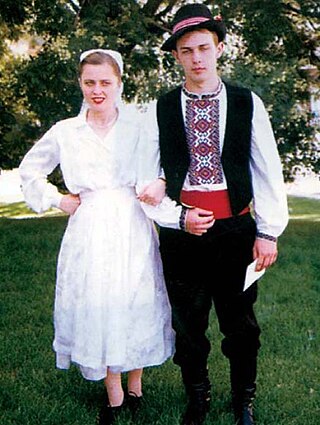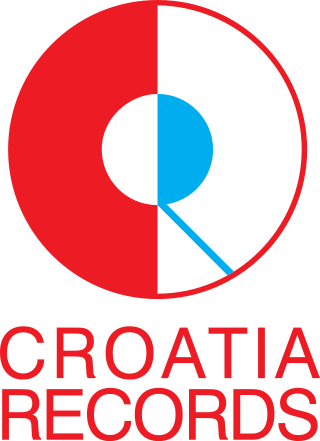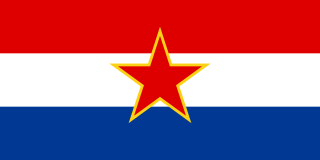Greek Canadians are Canadian citizens who have full or partial Greek heritage or people who emigrated from Greece and reside in Canada. According to the 2021 Census, there were 262,140 Canadians who claimed Greek ancestry.

Pannonian Rusyns, also known as Pannonian Rusnaks, and formerly known as Yugoslav Rusyns, are ethnic Rusyns from the southern regions of the Pannonian Plain. Their communities are located mainly in Vojvodina, Serbia, and Slavonia, Croatia. In both of those countries, they are officially recognized as a national minority, and have several minority institutions and organizations.

Croatia Records is a record label in Croatia, based in Zagreb.

The Socialist Republic of Croatia, commonly abbreviated as SR Croatia and referred to as simply Croatia, was a constituent republic and federated state of the Socialist Federal Republic of Yugoslavia. By its constitution, modern-day Croatia is its direct continuation.

Leopold Mandić [Mandich], OFMCap was a Croatian Capuchin friar and Catholic priest, who suffered from disabilities that would plague his speech and stature. He developed tremendous spiritual strength in spite of his disabilities and became extremely popular in his ministry as a confessor, often spending 12–15 hours in the confessional.

The community of Serbian Canadians includes Canadian citizens of Serb ethnicity, or people born in Serbia who permanently reside in Canada. Serbs have migrated to Canada in various waves during the 20th century. Today there are five or more generations of Serbs in the country. The 2021 census recorded 93,360 people in Canada declaring themselves as "Serbian". Serbian Canadians generally belong to the Serbian Orthodox Church and follow the Eastern Orthodox tradition.

The A4 motorway is a motorway in Croatia spanning 97.0 kilometres (60.3 mi). It connects the nation's capital, Zagreb, to the city of Varaždin and to Budapest, Hungary via the Goričan border crossing. The motorway represents a major north–south transportation corridor in Croatia and is a part of European routes E65 and E71. The A4 motorway route also follows Pan-European corridor Vb.
Croatia held an independence referendum on 19 May 1991, following the Croatian parliamentary elections of 1990 and the rise of ethnic tensions that led to the breakup of Yugoslavia. With 83 percent turnout, voters approved the referendum, with 93 percent in favor of independence. Subsequently, Croatia declared independence and the dissolution of its association with Yugoslavia on 25 June 1991, but it introduced a three-month moratorium on the decision when urged to do so by the European Community and the Conference on Security and Cooperation in Europe through the Brioni Agreement. The war in Croatia escalated during the moratorium, and on 8 October 1991, the Croatian Parliament severed all remaining ties with Yugoslavia. In 1992, the countries of the European Economic Community granted Croatia diplomatic recognition and Croatia was admitted to the United Nations.

The Order of Duke Trpimir, or more fully the Order of Duke Trpimir with Neck Badge and Morning Star, is an order of the Republic of Croatia. It ranks sixth in the Croatian order of precedence after the Grand Order of King Dmitar Zvonimir. It is awarded to Croatian and foreign ministerial level officials and others for merit in contributing to the independence, integrity and international reputation of the Republic of Croatia, the construction of Croatia, and development of relationships between Croatia and other countries.

Nicholas Tavelic, OFM was a Croatian Franciscan friar and missionary who died a martyr's death in Jerusalem on November 14, 1391. He was beatified with his companions, who included friars from Italy and France. All four members of his group have been declared saints by the Catholic Church, making Tavelic the first canonized Croatian saint.

The Canadian Soccer League was a Division 1 professional soccer league that operated for six seasons between 1987 and 1992. It was a nationwide league that had teams in six provinces over the course of its history. It was the last top-division league in Canada until the Canadian Premier League began play in 2019.
There are professional teams based in Canada in several professional sports leagues. The National Hockey League currently has seven Canadian franchises and is the most popular professional sports league in Canada. The Canadian Football League is the only all-Canadian major professional sports league. Major League Baseball, the National Basketball Association, Major League Soccer, and the Professional Women's Hockey League also have Canadian teams.

The independence of Croatia was a process started with the changes in the political system and the constitutional changes in 1990 that transformed the Socialist Republic of Croatia into the Republic of Croatia, which in turn proclaimed the Christmas Constitution, and held the 1991 Croatian independence referendum.
Dušan Bilandžić was a Croatian historian and politician.

Imra Agotić was a Croatian general who distinguished himself in the Croatian War of Independence.
Andrija Andabak was a Croatian soldier who distinguished himself in the Croatian War of Independence.
The Government of Croatia and the Holy See have signed four bilateral agreements and a protocol. Although the agreements proved controversial owing to great one-time and continuous financial and other burdens the agreements put on the Croatian state, no government of Croatia ever attempted to amend them. From the perspective of international law, these agreements may be seen as unjust to Croatia because of putting obligations chiefly on the Croatian state, but not on the Holy See.
The 1989 Canadian Soccer League season was the third season of play for the Canadian Soccer League, a Division 1 men's soccer league in the Canadian soccer pyramid.
Joško Ćaleta is a Croatian ethnomusicologist, music pedagogue, conductor, composer, record producer and klapa singer.

Charter of the Republic of Croatia is Croatian state decoration conferred by the President of the Republic of Croatia. It is awarded to international organizations, legal entities, foreign statesmen and Croatian and foreign citizens for their contribution to the development and promotion of the international position of the Republic of Croatia and for their contribution to the scientific, cultural, economic and other development of the Republic of Croatia. Croatian president awards it on his own initiative or on the proposal of the State Commission for Awards and Recognitions of the Republic of Croatia.












